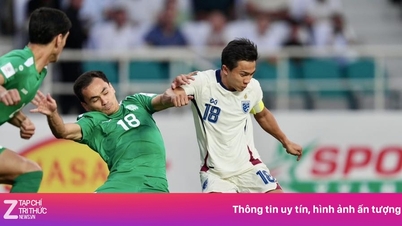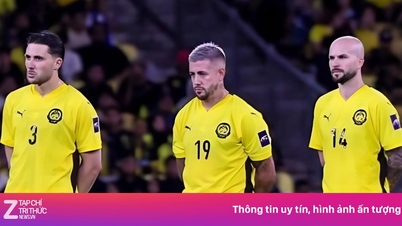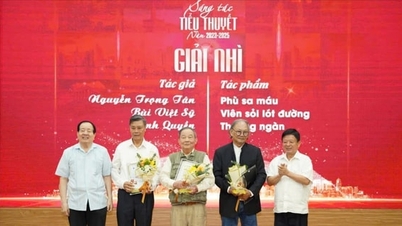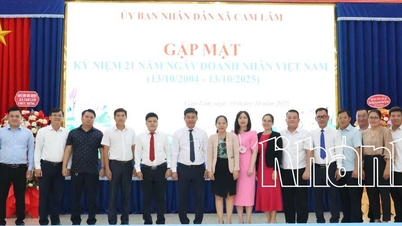Traditional sports – a bridge between culture and sustainable development
In the context of globalization and the strong development of modern sports, many traditional sports and games in the ASEAN region and China are facing the risk of being lost. The restoration and preservation of these values is therefore considered one of the important tasks, not only to preserve intangible cultural heritage, but also to foster solidarity, enhance people-to-people exchanges and create motivation for the development of cultural and sports tourism .
Traditional sports and games such as tug of war, stick pushing, crossbow shooting, traditional wrestling or volleyball... are closely associated with community life. They are not only recreational activities, improving health but also bear a strong cultural imprint, reflecting the customs, habits and history of each country and each region.

Pole pushing is one of the traditional sports that attracts a large number of young people to participate.
However, in the face of globalization and the explosion of modern sports, many values of traditional sports and games are gradually fading away, even disappearing in daily life. A segment of young people have little opportunity to come into contact with these traditional sports, making the risk of a break in the legacy increasingly evident.
ASEAN-China Cooperation: Strategic Solutions
In response to the above challenges, ASEAN and China have agreed to implement the ASEAN-China Traditional Sports and Games Revitalization Project. The project aims at many objectives: Research, collect and systematize unique traditional sports and games; Organize annual folk sports festivals to restore community living spaces; Integrate traditional games into schools as a physical education content, helping students understand and experience heritage; Enhance exchanges and competitions within the framework of ASEAN-China events, turning traditional sports into a cultural bridge.
In particular, this initiative is also linked to the trend of heritage conservation in sustainable development. Member countries can coordinate to include typical folk sports in the cultural and tourism cooperation program, contributing to attracting international tourists and developing the local economy.
Not only stopping at the cultural aspect, traditional sports also open up opportunities for the tourism industry. In many countries, festivals associated with folk games have become unique tourism products, attracting tens of thousands of visitors. If organized systematically and widely promoted, ASEAN-China folk sports can completely become a "soft brand" to help enhance the region's position in the international arena.
This is also a way for countries to exploit the advantage of "each locality has one cultural product", turning traditional sports into unique experiences, while creating more livelihoods for local communities.

Sack jumping is included in many school sports activities.
In the era of international integration, the restoration and preservation of ASEAN-China traditional sports and games is not only to preserve the past, but also to affirm the identity in the future. This is the basis for the younger generations to better understand their roots, appreciate cultural values and have the consciousness to inherit and promote.
ASEAN-China cooperation is therefore seen as a strategic move, both preserving heritage and creating new momentum for regional sports and culture. From tug of war, shuttlecock kicking, to little-known traditional games, all have the opportunity to revive, becoming a bridge connecting the past with the present, culture with tourism, and countries in a cohesive community rich in identity.
Vietnam contributes to spreading identity in ASEAN-China cooperation on traditional sports
In the process of cooperation in restoring and preserving traditional sports and games between ASEAN and China, Vietnam is considered one of the leading countries with many outstanding results, contributing to affirming the role, cultural identity and common responsibility of the region.
Vietnam is a country that possesses a rich treasure of traditional sports and games, such as tug of war, stick pushing, shuttlecock kicking, human chess, traditional wrestling, crossbow shooting, etc. Many sports not only exist in community life but are also elevated to become national-scale cultural and sports events, such as the Traditional Wrestling Festival in Bac Ninh, the Phu Tho Tug of War Festival or the International Shuttlecock Kicking Tournament held annually.
In particular, Vietnam, along with South Korea, Cambodia and the Philippines, jointly submitted a dossier to UNESCO to recognize tug of war as an Intangible Cultural Heritage of Humanity in 2015. This is a clear demonstration of Vietnam's proactive role and international responsibility in preserving common values.
Traditional wrestling, chess, shuttlecock kicking and many other folk games have been recognized by the Ministry of Culture, Sports and Tourism as national intangible cultural heritage. Traditional festivals such as the Giong Festival (Hanoi), Hung Temple Festival (Phu Tho), and Sinh Village Wrestling Festival (Hue) regularly organize folk games, creating conditions for people to directly participate. Folk game festivals in schools are held in many localities, helping the younger generation to access and maintain their attachment to traditional culture.
Many localities exploit traditional games and sports as special tourism products, typically Phu Tho tug of war, Quang Binh boat racing, Tay Nguyen stick pushing, etc. Folk sports events within the framework of the festival have attracted millions of domestic and international tourists, thereby contributing to the development of cultural and sports tourism.
Within the framework of cooperation with China, Vietnam has actively participated in many programs: Collecting, researching and digitizing documents on traditional games, creating a scientific basis for conservation; Bringing national sports and folk games into schools and mass sports movements, arousing the interest of young people; Participating in international festivals and exchanges, where traditional Vietnamese sports such as tug of war, shuttlecock kicking, and human chess have been highly appreciated by international friends for their uniqueness and cultural value; Connecting sports with tourism, when many folk festivals are exploited as unique tourism products, attracting a large number of domestic and foreign tourists.
Through these efforts, Vietnam has not only contributed to the successful implementation of the ASEAN-China joint initiative, but also affirmed its pioneering role in preserving intangible cultural heritage. This is also an opportunity to promote the image of a country rich in identity, friendly people and unique culture to regional and international friends.
Vietnam's participation in this cooperation shows a clear direction: conservation is not only for preservation, but also for development, turning traditional sports and games into a cultural and tourism bridge, while at the same time fostering community cohesion in the integration period.
Source: https://bvhttdl.gov.vn/thuc-day-hop-tac-asean-trung-quoc-trong-bao-ton-cac-mon-the-thao-tro-choi-truyen-thong-20251010104236873.htm



![[Photo] Ho Chi Minh City is brilliant with flags and flowers on the eve of the 1st Party Congress, term 2025-2030](https://vphoto.vietnam.vn/thumb/1200x675/vietnam/resource/IMAGE/2025/10/10/1760102923219_ndo_br_thiet-ke-chua-co-ten-43-png.webp)
![[Photo] "Exposing letters" in the flood center of Lang Son](https://vphoto.vietnam.vn/thumb/1200x675/vietnam/resource/IMAGE/2025/10/10/1760080117518_ndo_br_z7101324112737-07cd4d1c01801a8ccf4ae0cbaf31c4a3-507-jpg.webp)

![[Photo] Unique Phu Gia horse hat weaving craft](https://vphoto.vietnam.vn/thumb/1200x675/vietnam/resource/IMAGE/2025/10/10/1760084018320_ndo_br_01-jpg.webp)






















































































Comment (0)